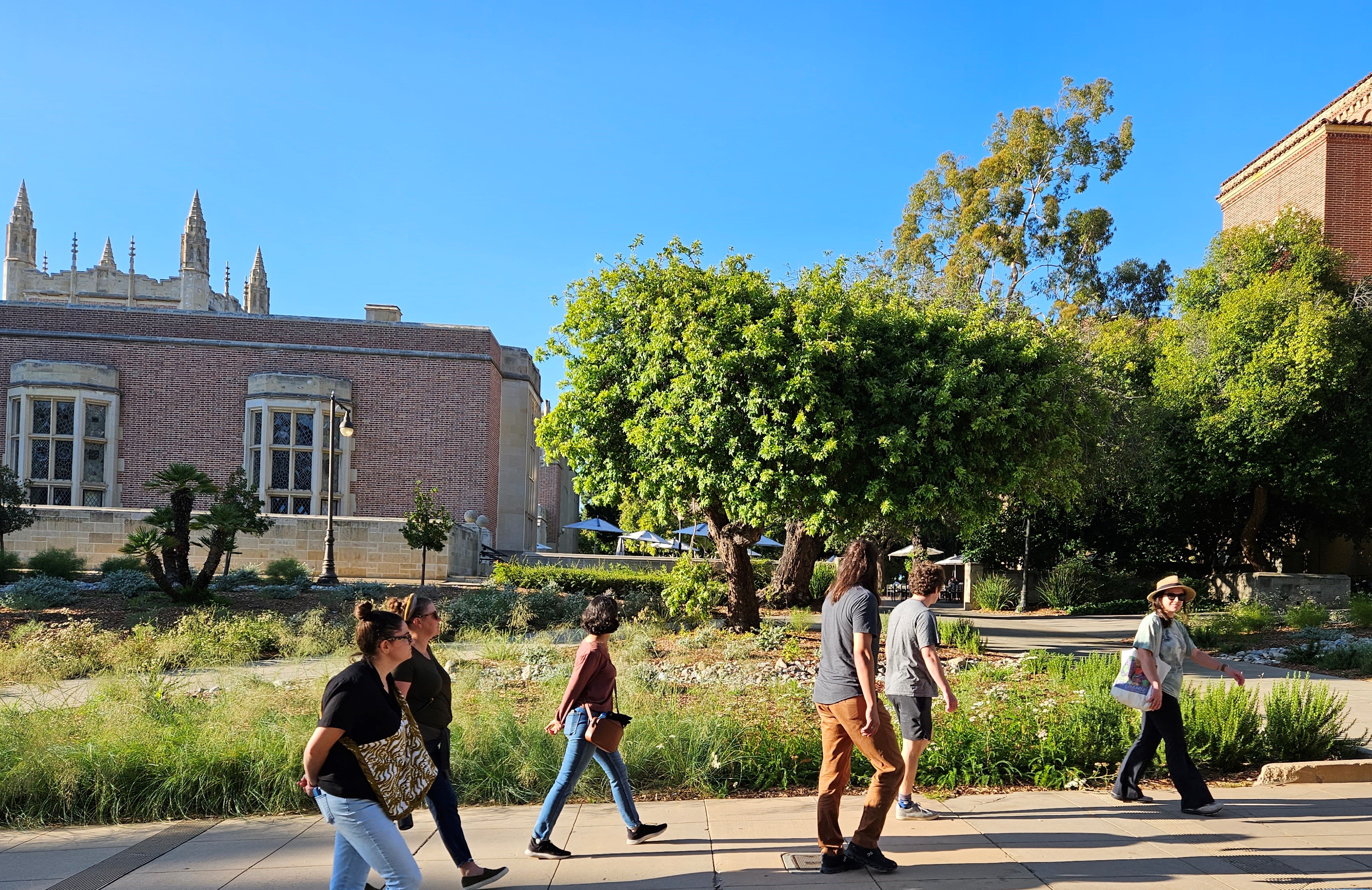UCLA Sustainability Plan Demonstrates Campus’ Progress Toward Green Initiatives
Earth Day is here, and our blue and gold university has gotten a shade greener. From sustainable food choices to energy-efficient buildings and native plant landscaping, UCLA has completed several initiatives and made progress toward many of the targets set by the UCLA Sustainability Plan, a comprehensive framework for climate action and solutions that was introduced in 2022.
Led by the UCLA Sustainability Committee and developed by stakeholders from across campus with input from faculty, researchers, staff and students, the plan identifies areas for furthering sustainability efforts in operations, education, research and service. Divided into pillars of planetary and human health, climate and energy, food systems, green buildings, landscape and biodiversity, transportation, waste, water and more are defined goals to establish a more sustainable institution.
Newer goal areas include curricula and research and equity, diversity and inclusion, with others building on existing plans for improvement. Here’s a look at some of the progress made over the past two years.
Create a pathway to decarbonization
A study is underway to identify ways for the campus to achieve a 90% reduction in Scope 1 carbon emissions through switching to cleaner energy alternatives and reducing on-site fossil fuel use. UCLA’s study will be completed this summer and support the development of an updated Climate Action Plan for the campus.
Advance education about planetary and human health
UCLA Health’s Internal Medicine-Preventive Medicine Residency program offers training about health and the interconnection of climate and environmental harms. The Center for Nursing Excellence at UCLA Health has also created educational content regarding the health impacts of climate change.
Reduce energy use and utilize clean power
Energy efficiency work continues through Facilities Management’s Smart Buildings and Lab program. Results from completed buildings show a 30% to 50% reduction in energy use. High-efficiency LED bulbs and fixtures are replacing florescent fixtures in hallways and common spaces, with an average kilowatt-hour savings of over 60%.
UCLA has selected a firm to install significant on-site solar as part of a power purchase agreement with the LAWDP. Contracts have been signed for the first six sites and the projects are currently in design. UCLA is on track to achieve 100% clean electricity procurement by 2025.
And the new UCLA Nimoy Theater is all-electric, with the Sunset Canyon Recreation Center soon to follow. The university is also in the process of moving nearly all physical server storage to cloud storage which will save significant energy, in addition to money and space.
Activate campus landscapes for people and nature
The campus landscape continues to transform to support outdoor study spaces and native landscaping. In partnership with American Indian Studies, a space near Campbell Hall was transitioned into an indigenous-focused garden space.
Additionally, 13,642 square feet of underutilized turf were replaced with native plants adjacent to Moore Hall.
Efforts to support the Bee Campus USA designation are almost complete, with UCLA also discontinuing the use of pesticides.

Reduce waste generation and water use
There has been a significant reduction in waste generation from pre-pandemic levels.
UCLA continues to reduce potable water use, with continuing water reclamation efforts resulting in savings of over 40 million gallons of water per year from HVAC condensate, vacuum pumps and autoclave rinse cycles.
Support sustainable food choices
Dining Services currently has 37% plant-based menu options and recently pledged to serve 50% plant-based meals on campus by 2027. Housing and Hospitality, in partnership with the Bruin Dine student organization, recovers food from the dining halls and redistributes it to students and staff in need.
The Teaching Kitchen space at UCLA hosts sessions on health, affordable dining, meatless and plant-based cuisine, sustainable entrees and low-carbon-footprint dishes.
Lower transportation sector emissions
UCLA joined the Sepulveda Transit Corridor for All coalition to advocate for a project option that includes a station on campus and a direct connection to the Purple (D Line) station coming to Westwood. Metro Bike Share expanded options for the campus community, with the Drake Stadium dock one of the most used stations in Los Angeles County.
The new Bruin U-Pass program for all undergraduate students offers unlimited, fare-free rides on local and commuter lines throughout L.A. County for a small quarterly tuition fee. The pass introduction has resulted in an increase in public transit trips among resident and commuter students.

